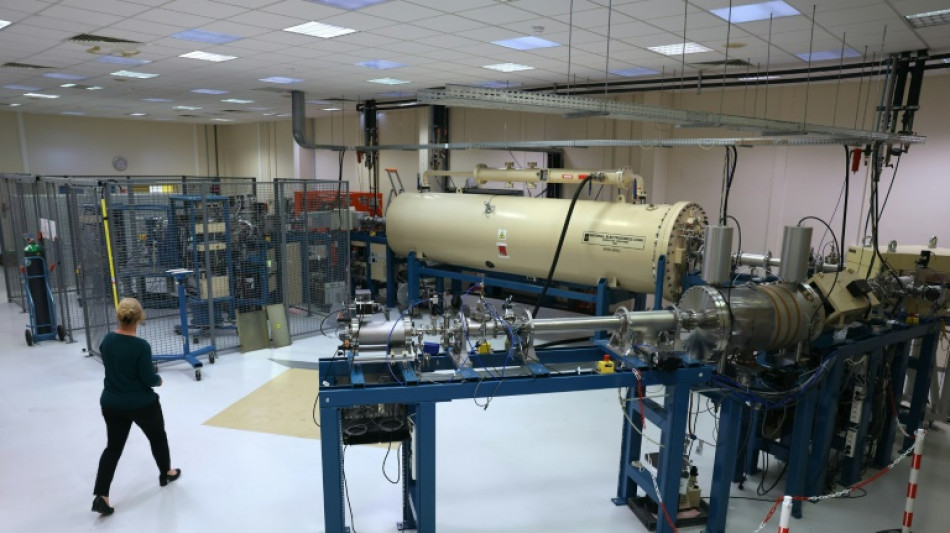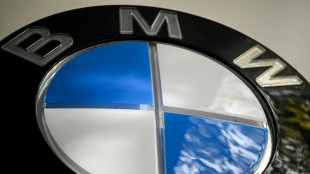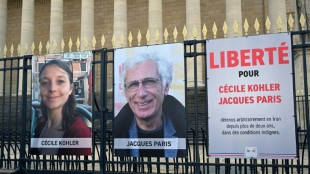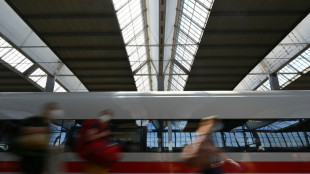
-
 BMW reports rising profitability, shares jump
BMW reports rising profitability, shares jump
-
Bolivia Supreme Court orders release of jailed ex-president Jeanine Anez

-
 Wall Street stocks rise after positive jobs data
Wall Street stocks rise after positive jobs data
-
'Hostage diplomacy': longstanding Iran tactic presenting dilemma for West

-
 Rybakina stays perfect at WTA Finals with win over alternate Alexandrova
Rybakina stays perfect at WTA Finals with win over alternate Alexandrova
-
Le Garrec welcomes Dupont help in training for Springboks showdown

-
 Brussels wants high-speed rail linking EU capitals by 2040
Brussels wants high-speed rail linking EU capitals by 2040
-
Swiss business chiefs met Trump on tariffs: Bern

-
 Spain's exiled king recounts history, scandals in wistful memoir
Spain's exiled king recounts history, scandals in wistful memoir
-
Wall Street stocks steady after positive jobs data

-
 Trump blasts Democrats as government shutdown becomes longest ever
Trump blasts Democrats as government shutdown becomes longest ever
-
Indian pilgrims find 'warm welcome' in Pakistan despite tensions

-
 Inter and AC Milan complete purchase of San Siro
Inter and AC Milan complete purchase of San Siro
-
Swedish authorities inspect worksite conditions at steel startup Stegra

-
 Keys withdraws from WTA Finals with illness
Keys withdraws from WTA Finals with illness
-
Prince Harry says proud to be British despite new life in US

-
 EU strikes last-ditch deal on climate targets as COP30 looms
EU strikes last-ditch deal on climate targets as COP30 looms
-
Stocks retreat as tech bubble fears grow

-
 Shein opens first permanent store amid heavy police presence
Shein opens first permanent store amid heavy police presence
-
West Indies edge New Zealand despite Santner brilliance

-
 French pair released by Iran await return home
French pair released by Iran await return home
-
German factory orders up but outlook still muted

-
 Death toll tops 100 as Philippines digs out after typhoon
Death toll tops 100 as Philippines digs out after typhoon
-
Attack on key city in Sudan's Kordofan region kills 40: UN

-
 'No one could stop it': Sudanese describe mass rapes while fleeing El-Fasher
'No one could stop it': Sudanese describe mass rapes while fleeing El-Fasher
-
Champagne and cheers across New York as Mamdani soars to victory

-
 Medieval tower collapse adds to Italy's workplace toll
Medieval tower collapse adds to Italy's workplace toll
-
BMW boosts profitability despite China, tariff woes

-
 South Africa's Wiese wary of 'hurt' France before re-match
South Africa's Wiese wary of 'hurt' France before re-match
-
Beyond limits: Croatian freediver's breathtaking record

-
 Tottenham supporting Udogie after alleged gun threat in London
Tottenham supporting Udogie after alleged gun threat in London
-
Thunder roll Clippers to stay unbeaten as SGA keeps streak alive

-
 In appeal, Australian mushroom murderer alleges 'miscarriage of justice'
In appeal, Australian mushroom murderer alleges 'miscarriage of justice'
-
Toyota hikes profit forecasts 'despite US tariffs'

-
 Ex-France lock Willemse challenges Meafou to become 'the bully'
Ex-France lock Willemse challenges Meafou to become 'the bully'
-
Ukrainians to honour sporting dead by building country they 'died for': minister

-
 At least 7 dead after UPS cargo plane crashes near Louisville airport
At least 7 dead after UPS cargo plane crashes near Louisville airport
-
US Supreme Court hears challenge to Trump tariff powers

-
 US government shutdown becomes longest in history
US government shutdown becomes longest in history
-
India's Modi readies bellwether poll in poorest state

-
 Green goals versus growth needs: India's climate scorecard
Green goals versus growth needs: India's climate scorecard
-
Where things stand on China-US trade after Trump and Xi talk

-
 Sri Lanka targets big fish in anti-corruption push
Sri Lanka targets big fish in anti-corruption push
-
NY elects leftist mayor on big election night for Democrats

-
 Injured Jordie Barrett to miss rest of All Blacks tour
Injured Jordie Barrett to miss rest of All Blacks tour
-
Asian markets tumble as tech bubble fears grow

-
 Pay to protect: Brazil pitches new forest fund at COP30
Pay to protect: Brazil pitches new forest fund at COP30
-
Iraq's social media mercenaries dying for Russia

-
 Young leftist Trump foe elected New York mayor
Young leftist Trump foe elected New York mayor
-
Concerns at ILO over expected appointment of close Trump advisor


Time machine: How carbon dating brings the past back to life
From unmasking art forgery to uncovering the secrets of the Notre-Dame cathedral, an imposing machine outside Paris can turn back the clock to reveal the truth.
It uses a technique called carbon dating, which has "revolutionised archaeology", winning its discoverer a Nobel Prize in 1960, French scientist Lucile Beck said.
She spoke to AFP in front of the huge particle accelerator, which takes up an entire room in the carbon dating lab of France's Atomic Energy Commission in Saclay, outside the capital.
Beck described the "surprise and disbelief" among prehistorians in the 1990s when the machine revealed that cave art in the Chauvet Cave in France's southeast was 36,000 years old.
The laboratory uses carbon dating, also called carbon-14, to figure out the timeline of more than 3,000 samples a year.
- So how does it work? -
First, each sample is examined for any trace of contamination.
"Typically, they are fibres from a jumper" of the archaeologist who first handled the object, Beck said.
The sample is then cleaned in an acid bath and heated to 800 degrees Celsius (1,472 Fahrenheit) to recover its carbon dioxide. This gas is then reduced to graphite and inserted into tiny capsules.
Next, these capsules are put into the particle accelerator, which separates their carbon isotopes.
Isotopes are variants of the same chemical element which have different numbers of neutrons.
Some isotopes are stable, such as carbon-12. Others -- such as carbon-14 -- are radioactive and decay over time.
Carbon-14 is constantly being created in Earth's upper atmosphere as cosmic rays and solar radiation bombard the chemical nitrogen.
In the atmosphere, this creates carbon dioxide, which is absorbed by plants during photosynthesis.
Then animals such as ourselves get in on the act by eating those plants.
So all living organisms contain carbon-14, and when they die, it starts decaying. Only half of it remains after 5,730 years.
After 50,000 years, nothing is left -- making this the limit on how far back carbon dating can probe.
By comparing the number of carbon-12 and carbon-14 particles separated by the particle accelerator, scientists can get an estimate of how old something is.
Cosmic radiation is not constant, nor is the intensity of the magnetic field around Earth protecting us from it, Beck said.
That means scientists have to make estimations based on calculations using samples whose ages are definitively known.
This all makes it possible to spot a forged painting, for example, by demonstrating that the linen used in the canvas was harvested well after when the purported painter died.
The technique can also establish the changes in our planet's climate over the millennia by analysing the skeletons of plankton found at the bottom of the ocean.
- Notre-Dame revealed -
Carbon dating can be used on bones, wood and more, but the French lab has developed new methods allowing them to date materials that do not directly derive from living organisms.
For example, they can date the carbon that was trapped in iron from when its ore was first heated by charcoal.
After Paris's famous Notre-Dame cathedral almost burned to the ground in 2019, this method revealed that its big iron staples dated back to when it was first built -- and not to a later restoration, as had been thought.
The technique can also analyse the pigment lead white, which has been painted on buildings and used in artworks across the world since the fourth century BC.
To make this pigment, "lead was corroded with vinegar and horse poo, which produces carbon dioxide through fermentation," Beck explained.
She said she always tells archaeologists: "don't clean traces of corrosion, they also tell about the past!"
Another trick made it possible to date the tombs of a medieval abbey in which only small lead bottles had been found.
As the bodies in the tombs decomposed, they released carbon dioxide, corroding the bottles and giving scientists the clue they needed.
"This corrosion was ultimately the only remaining evidence of the spirit of the monks," Beck mused.
R.Fischer--VB




